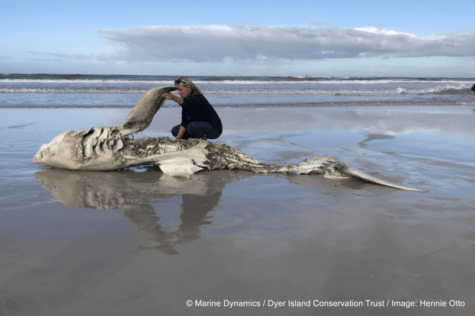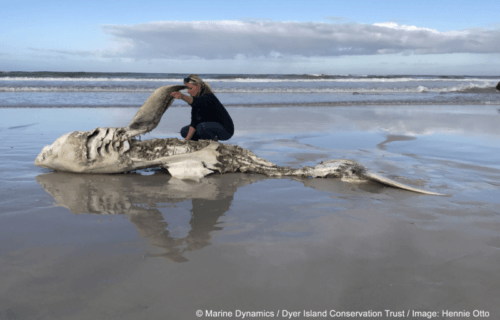GANSBAAI, South Africa — A pair of orcas (or killer whales) may be the new Bonnie and Clyde of the sea. According to a new study, the duo has been terrorizing and killing great white sharks off the coast of South Africa — sending the fierce species fleeing for their lives!
Despite great white sharks being the dominant species off the Gansbaai coast for years, new tracking data and shark sightings reveal that these famous predators are now avoiding the area completely. Researchers say the obvious reason is they’re scared of becoming prey for the orca.
The killer whales are gutting local sharks!
Since 2017, eight great white sharks have washed up on shore after a deadly orca attack. Seven of the sharks had their livers ripped out. Some of these predators had their hearts eaten as well.
Study authors say the wounds are clearly the work of the same pair of killer whales now living in the area. Moreover, the team believes their body count is even higher, but those sharks haven’t washed up on land. While some whale species strictly feed on small shrimp (krill), orcas are more than capable of attacking large predators like sharks.
The revelation that sharks are abandoning one of their popular hunting grounds provides more evidence that sharks use the “flight” sense of fear when underwater predators are nearby. This also triggers a swift and long-term exodus from particular areas of the ocean. Simply put, the word goes out to all sharks that it’s time to leave.

This is my house now!
During this five-and-a-half-year study, researchers tracked 14 sharks fleeing the area near South Africa when orcas arrive. Visual sightings of sharks in certain Western Cape bays have also dropped off dramatically.
Until recently, Gansbaai has been a world-famous spot for tourists looking to see a great white shark. Now, this ferocious pair of killer whales are completely changing the local landscape, with sharks no longer around to be the dominant predators in the water.
“Initially, following an Orca attack in Gansbaai, individual Great White Sharks did not appear for weeks or months. What we seem to be witnessing though is a large-scale avoidance (rather than a fine-scale) strategy, mirroring what we see used by wild dogs in the Serengeti in Tanzania, in response to increased lion presence. The more the Orcas frequent these sites, the longer the Great White Sharks stay away,” says lead author Alison Towner, a senior white shark biologist at the Dyer Island Conservation Trust, in a media release.
“The research is particularly important, as by determining how large marine predators respond to risk, we can understand the dynamics of coexistence with other predator communities; and these dynamics may also dictate the interactions between competitors or intra-guild predator/prey relationship.”
Prior to these attacks by the killer whales, there were only two instances since 2007 where the sharks disappeared for more than a week.
The change is disrupting the local food chain
With great whites fleeing, Towner says other species which sharks usually dine on are moving up the food chain.
“It has triggered the emergence of a new mesopredator to the area, the Bronze Whaler Shark – which is known to be eaten by the Great White Shark – and these Bronze Whalers are also being attacked by the Orcas too, who are indicating a level of experience and skill in hunting large sharks.”
“However, balance is crucial in marine ecosystems, for example, with no Great White Sharks restricting Cape Fur seal behavior, the seals can predate on critically endangered African Penguins, or compete for the small pelagic fish they eat. That’s a top-down impact, we also have ‘bottom up’ trophic pressures from extensive removal of Abalone, which graze the kelp forests these species are all connected through.”
“To put it simply, although this is a hypothesis for now, there is only so much pressure an ecosystem can take, and the impacts of Orcas removing sharks, are likely far wider-reaching.”
Why are these whales targeting sharks?
Study authors note that the pair are easily recognizable thanks to their distinctive collapsed dorsal fins. As for what attracted them to Gansbaai, the team believes these two might be part of a rare shark-eating subtype of orca, which hunt at least three different kinds of shark species for food.
“This change in both top predators’ behavior could,” Towner says, “be related to a decline in prey populations, including fishes and sharks, causing changes in their distribution pattern.”
“We know that Great White Sharks face their highest targeted mortality in the anti-shark bather protection nets in KwaZulu Natal, they simply cannot afford additional pressure now from Orca, killer whale predation.”
Towner adds that the orcas are focusing on eating adolescent sharks, which could have a major impact on the growth of their species in the long run.
“The Orcas are targeting subadult Great White Sharks, which can further impact an already vulnerable shark population owing to their slow growth and late-maturing life-history strategy. Increased vigilance using citizen science (e.g. fishers’ reports, tourism vessels), as well as continued tracking studies, will aid in collecting more information on how these predations may impact the long-term ecological balance in these complex coastal seascapes,” the study author continues.

Is fear the only thing driving sharks away?
Researchers note that they can’t count out the impact of climate change on this latest pattern. It’s possible sea surface temperature changes are also to blame for the absence of great white sharks near South Africa, according to the study.
“Other potential explanations for a decline at Gansbaai could be direct fishing of Great White Sharks or the indirect effect of fishery-induced declines in potential prey,” researchers conclude.
However, they caution that while this could “potentially contribute to an overall decline in numbers of Great Whites in South Africa, they are unlikely to explain the sudden localized decline.”
The findings are published in the African Journal of Marine Science.
